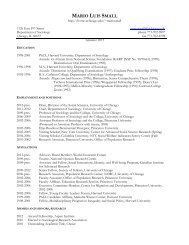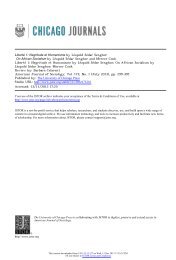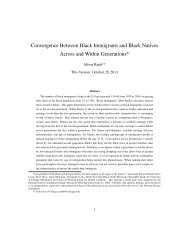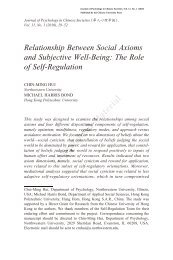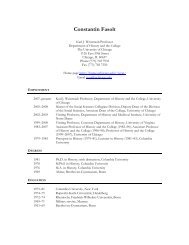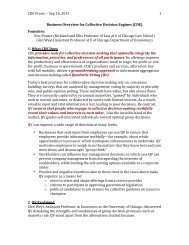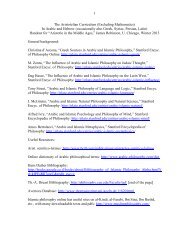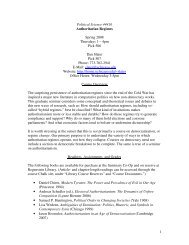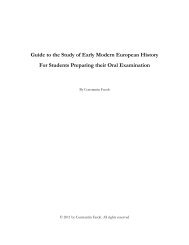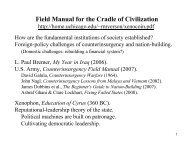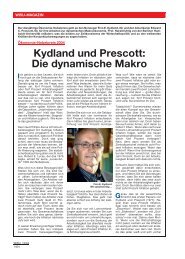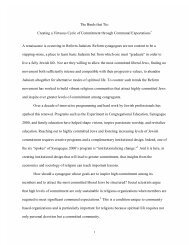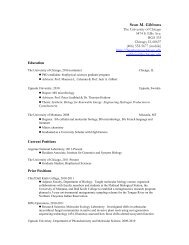Job Market Paper - Personal Web Pages - University of Chicago
Job Market Paper - Personal Web Pages - University of Chicago
Job Market Paper - Personal Web Pages - University of Chicago
Create successful ePaper yourself
Turn your PDF publications into a flip-book with our unique Google optimized e-Paper software.
Kim: Endogenous Choice <strong>of</strong> a Mediator<br />
3 Cooperative Approach<br />
My goal is to develop a formal argument <strong>of</strong> endogenous choice <strong>of</strong> a mediator that determines the<br />
smallest possible set <strong>of</strong> solutions, so as to get the strongest possible predictions. At some level,<br />
there is potentially an endless variation to an extensive form communication game <strong>of</strong> the negotiation<br />
process over selecting mediators, which I am not explicitly modeling. Instead, I take pay<strong>of</strong>fs and<br />
the existence <strong>of</strong> incentive feasible mediators as primitives. The revelation principle implies that<br />
if all incentive compatible direct mechanisms have some property, then every equilibrium <strong>of</strong> every<br />
game form has this property. With a cooperative approach, I am explicitly taking into account the<br />
information leakage problem by imposing relevant properties or axioms that must be satisfied for a<br />
reasonable solution. In this section, I characterize the interim incentive efficient set and the neutral<br />
bargaining solution using the solution concepts in Holmström and Myerson (1983) and Myerson<br />
(1984b); and I show the inefficiency in bargaining. All pro<strong>of</strong>s are in Appendix A or Online Appendix<br />
B.<br />
3.1 The Interim Incentive Efficient Set<br />
An incentive feasible mediator associated with a mechanism µ is interim incentive efficient if and<br />
only if there exists no other incentive feasible mediator with a mechanism that is interim Pareto<br />
superior to µ. If every player would surely prefer µ ′<br />
over µ when he knows his own type, whatever<br />
his type might be, then µ ′ is interim Pareto superior to µ. Interim welfare is evaluated after<br />
each player learns his own type but before he learns the other player’s type. An incentive feasible<br />
mediator associated with a mechanism µ is ex ante incentive efficient if and only if there exists<br />
no other incentive feasible mediator with a mechanism that is ex ante Pareto superior to µ. Ex<br />
ante welfare is evaluated before any types are specified. If a mediator is incentive efficient, then<br />
another mediator who does not know any player’s actual type could not propose any other incentive<br />
feasible mediation mechanism that every player is sure to prefer according to an appropriate welfare<br />
criterion. 12<br />
One might naively consider ex ante incentive efficiency to be a requirement for a bargaining<br />
solution. But if a player expresses a preference for the ex ante incentive efficient outcome, it would<br />
be giving information to the other side that might be detrimental. Therefore, we have no reason<br />
a priori to expect the ex ante incentive efficient outcome to be negotiated with privately informed<br />
12 Note that for any given set <strong>of</strong> incentive feasible mechanisms, the set <strong>of</strong> ex ante incentive efficient mechanisms is<br />
a subset <strong>of</strong> the set <strong>of</strong> interim incentive efficient mechanisms.<br />
10



